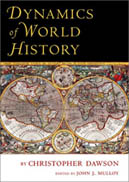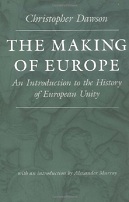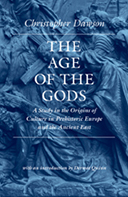 Dynamics of World History is an anthology of the work of Christopher Dawson spanning 35 years. It consists of excerpts from his books, as well as articles published in a variety of academic journals. These range from his earliest published article in The Sociological Review in 1921 to his critique of Arnold Toynbee’s Study of History which appeared in International Affairs in 1955.
Dynamics of World History is an anthology of the work of Christopher Dawson spanning 35 years. It consists of excerpts from his books, as well as articles published in a variety of academic journals. These range from his earliest published article in The Sociological Review in 1921 to his critique of Arnold Toynbee’s Study of History which appeared in International Affairs in 1955.
Central Themes
In the first part, Dawson explains his view of the relationship between sociology and history thus: “Sociology deals with the structure of society, and history with its evolution, so that they are related to one another in the same way as general biology is related to the study of organic evolution.” He also emphasizes the sociological role of religion, not in the reductionist manner that was common at the time, but as the greatest source of vitality in a culture. He approaches all religious expressions with respect and profound insight, even when he does not endorse them, and sees a basic spiritual intuition at the root of all religious forms from the most primitive to the most developed.
The second part of the work begins with a section entitled Christianity and the Meaning of History in which Dawson describes what he sees as the revolutionary impact of Christianity and Western culture on world civilization. In the following section he discusses The Problem of Metahistory, a concept which he not only defends, but positively advocates, pointing out that the great historians such as Tocqueville and Ranke were all possessed of a distinctive world-view.
Evaluation of the Work
Dynamics of World History is not merely a selection from Dawson’s works, but presents aspects of his thought that are not so widely known. In his excellent introduction to the work, John Mulloy explains that one of the reasons why Christopher Dawson’s significance as a philosopher of history and culture is not so widely appreciated is that most of his published work was concentrated on two main areas: the historical development of Western culture and the causes of the contemporary world crisis.
This work will therefore appeal particularly to anthropologists and sociologists interested in the comparative study of culture and society, as well as those who wish to explore further Christopher Dawson’s own distinctive conception of world history.
PRAISE FOR THE ORIGINAL EDITION:
“For breadth of knowledge and lucidity of style [Dawson] has few rivals.” – New York Times, 1957


